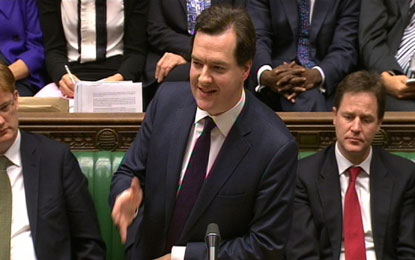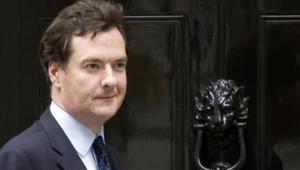By Vivienne Russell | 5 December 2012
Local authorities will face additional cuts of 2% in 2014/15, but have been spared the 1% reduction being imposed next year on most other areas of Whitehall spending, Chancellor George Osborne announced in his Autumn Statement today.

The statement confirmed widespread speculation that the government’s austerity programme would continue for an extra year until 2017/18, deep into the next Parliament. This extension to the fiscal consolidation will take state spending down to 39.5% of national income from 48% in 2009/10, the chancellor said.
Departmental resource budgets are to be cut by 1% next year and 2% the year after, although local government was granted an exemption. Osborne said: ‘Local government budgets are already being held down next year to deliver the freeze in council tax, so we will not seek the additional 1% savings next year – but we will look for the 2% saving the year after.’
However, councils were quick to brand the 2% cut ‘unsustainable.’ Local Government Association chair Sir Merrick Cockell said it ‘made no sense economically’.
He added: ‘Local government is one of the few parts of the public sector which actively promotes economic growth… the government must enable that role rather than implement fresh cuts which will force councils to further wind down the essential support they can provide to local economic growth.’
Osborne was prompted to take action after the Office for Budget Responsibility confirmed that the weak economic performance over the past two years meant the government was set to miss his target for debt to be falling by the end of the current Parliament in 2015/16. According to OBR forecasts, debt is set to continue to rise over the next three years, peaking at 79.9% in 2015/16 before beginning to fall again.
Rather than impose further cuts of £17bn a year, the chancellor said he had chosen to continue the austerity programme for one more year.
‘No decision to cut spending is ever easy,’ Osborne said. ‘But those who object must explain whether instead they would have higher taxes, or higher borrowing or both.’
He announced a Spending Review for the ‘first half of next year’, that would give further details of departmental spending plans for 2015/16.
‘The government has shown that it is possible to restore sanity to the public finances while improving the quality of our public services,’ the chancellor said.
He confirmed that, by the end of 2015/16, the government would ‘almost exactly’ deliver on the goal to maintain a ratio of 80:20 spending cuts to tax rises.
Responding to the statement, CIPFA chief executive Steve Freer said: ‘The announcement of a 1% further cut in departmental budgets next year, rising to 2% in 2014/15, raises the bar for public bodies across the country. Most have long since exhausted measures which have limited impact on service delivery to the public. In many organisations the greater part of this further salami slice is likely to go straight to frontline budgets.’
He added that exempting local government from next year’s 1% reduction was likely to be an acknowledgement of the significant cuts already demanded of this sector and the major financial reforms due to take effect in councils in April.
While there was gloomy news for Osborne on his debt target, the OBR also concluded that there was a greater-than-50% chance of meeting the principal fiscal mandate to eliminate the structural deficit ‘in five years time’.
The deficit has been falling, he said. The OBR forecasts it will keep falling, dropping from 6.9% this year to 6.1% next year, and reaching 1.6% in 2017/18.
On growth, the OBR is predicting an overall contraction of 0.1% for this year, with the economy set to grow by 1.2% next year, 2% in 2014 and rising year-on-year thereafter, reaching 2.8% in 2017.
According to the OBR, the effects of the 2008/09 downturn are deeper than initially thought and will continue to be felt for several years to come.
‘Britain is heading in the right direction,’ said Osborne. ‘The road is hard but we’re making progress.’





















